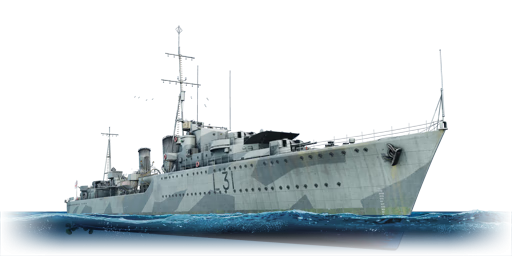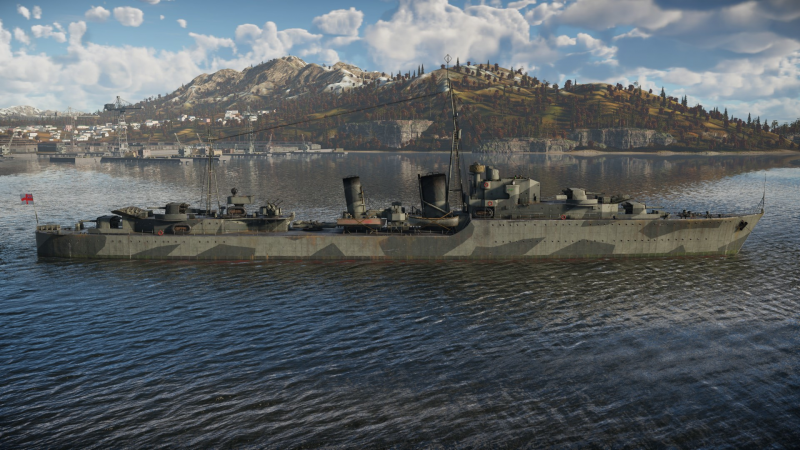Difference between revisions of "HMS Mohawk"
(→Additional armament) |
(→Armament) |
||
| Line 102: | Line 102: | ||
{{main|2pdr QF Mk.IIc (40 mm)}} | {{main|2pdr QF Mk.IIc (40 mm)}} | ||
| − | + | {| class="wikitable sortable" style="text-align:center" width="100%" | |
| + | ! colspan="7" | Penetration statistics | ||
| + | |- | ||
| + | ! rowspan="2" data-sort-type="text" | Shell | ||
| + | ! colspan="6" | Penetration @ 0° Angle of Attack (mm) | ||
| + | |- | ||
| + | ! 10 m !! 100 m !! 500 m !! 1,000 m !! 1,500 m !! 2,000 m | ||
| + | |- | ||
| + | | AP-T || 60 || 57 || 50 || 43 || 38 || 34 | ||
| + | |- | ||
| + | | HEF || 3 || 3 || 3 || 3 || 3 || 3 | ||
| + | |- | ||
| + | |} | ||
| + | {| class="wikitable sortable" style="text-align:center" width="100%" | ||
| + | ! colspan="10" | Shell details | ||
| + | |- | ||
| + | ! rowspan="2" data-sort-type="text" | Ammunition | ||
| + | ! rowspan="2" | Velocity<br>(m/s) | ||
| + | ! rowspan="2" | Projectile<br>Mass (kg) | ||
| + | ! rowspan="2" | Fuse delay<br>(m) | ||
| + | ! rowspan="2" | Fuse sensitivity<br>(mm) | ||
| + | ! rowspan="2" | Explosive Mass<br>(TNT equivalent) (g) | ||
| + | ! colspan="3" | Ricochet | ||
| + | |- | ||
| + | ! 0% !! 50% !! 100% | ||
| + | |- | ||
| + | | AP-T || 701 || 0.91 || N/A || N/A || N/A || 47° || 60° || 65° | ||
| + | |- | ||
| + | | HEF || 701 || 0.82 || 0 || 0.1 || 71 || 79° || 80° || 81° | ||
| + | |- | ||
| + | |} | ||
=== Anti-aircraft armament === | === Anti-aircraft armament === | ||
Revision as of 03:30, 28 October 2022
| This page is about the British destroyer HMS Mohawk. For other Tribal-class destroyers, see Tribal (Family). |
Contents
Description
The Tribal-class, HMS Mohawk (L31), 1941 is a premium gift rank II British destroyer with a battle rating of 4.7 (AB/RB/SB). It was introduced during Update "Direct Hit" as a reward for the 2021 Export Order event.
A Tribal-class destroyer, HMS Mohawk is unique in that it carries a fourth main turret, allowing for increased firepower over its sisters, in exchange, it has a smaller AA battery.
General info
Survivability and armour
Talk about the vehicle's armour. Note the most well-defended and most vulnerable zones, e.g. the ammo magazine. Evaluate the composition of components and assemblies responsible for movement and manoeuvrability. Evaluate the survivability of the primary and secondary armaments separately. Don't forget to mention the size of the crew, which plays an important role in fleet mechanics. Save tips on preserving survivability for the "Usage in battles" section. If necessary, use a graphical template to show the most well-protected or most vulnerable points in the armour.
Mobility
Write about the ship's mobility. Evaluate its power and manoeuvrability, rudder rerouting speed, stopping speed at full tilt, with its maximum forward and reverse speed.
| Mobility Characteristics | |||
|---|---|---|---|
| Game Mode | Upgrade Status | Maximum Speed (km/h) | |
| Forward | Reverse | ||
| AB | |||
| Upgraded | 82 | 31 | |
| RB/SB | |||
| Upgraded | 67 | 25 | |
Modifications and economy
Armament
Primary armament
| Penetration statistics | |||||||
|---|---|---|---|---|---|---|---|
| Ammunition | Type of warhead |
Penetration @ 0° Angle of Attack (mm) | |||||
| 1,000 m | 2,500 m | 5,000 m | 7,500 m | 10,000 m | 15,000 m | ||
| HE Mk.VIIA | HE | 35 | 35 | 35 | 35 | 35 | 35 |
| SAP Mk.VA | SAP | 116 | 92 | 63 | 44 | 33 | 29 |
| HE-TF Mk.VIIA | HE-TF | 35 | 35 | 35 | 35 | 35 | 35 |
| HE-VT Mk.VIIA | HE-VT | 35 | 35 | 35 | 35 | 35 | 35 |
| Shell details | |||||||||
|---|---|---|---|---|---|---|---|---|---|
| Ammunition | Type of warhead |
Velocity (m/s) |
Projectile mass (kg) |
Fuse delay (s) |
Fuse sensitivity (mm) |
Explosive mass (TNT equivalent) (g) |
Ricochet | ||
| 0% | 50% | 100% | |||||||
| HE Mk.VIIA | HE | 808 | 22.68 | 0 | 0.1 | 3,000 | 79° | 80° | 81° |
| SAP Mk.VA | SAP | 808 | 22.68 | 0.015 | 5 | 900 | 47° | 60° | 65° |
| HE-TF Mk.VIIA | HE-TF | 808 | 22.68 | 0 | 0.1 | 3,000 | 79° | 80° | 81° |
| Proximity-fused shell details | |||||||||||
|---|---|---|---|---|---|---|---|---|---|---|---|
| Ammunition | Type of warhead |
Velocity (m/s) |
Projectile mass (kg) |
Fuse delay (m) |
Fuse sensitivity (mm) |
Arming distance (m) |
Trigger radius (m) |
Explosive mass (TNT equivalent) (g) |
Ricochet | ||
| 0% | 50% | 100% | |||||||||
| HE-VT Mk.VIIA | HE-VT | 808 | 22.68 | 0 | 0.1 | 244 | 23 | 3,000 | 79° | 80° | 81° |
Secondary armament
| Penetration statistics | ||||||
|---|---|---|---|---|---|---|
| Shell | Penetration @ 0° Angle of Attack (mm) | |||||
| 10 m | 100 m | 500 m | 1,000 m | 1,500 m | 2,000 m | |
| AP-T | 60 | 57 | 50 | 43 | 38 | 34 |
| HEF | 3 | 3 | 3 | 3 | 3 | 3 |
| Shell details | |||||||||
|---|---|---|---|---|---|---|---|---|---|
| Ammunition | Velocity (m/s) |
Projectile Mass (kg) |
Fuse delay (m) |
Fuse sensitivity (mm) |
Explosive Mass (TNT equivalent) (g) |
Ricochet | |||
| 0% | 50% | 100% | |||||||
| AP-T | 701 | 0.91 | N/A | N/A | N/A | 47° | 60° | 65° | |
| HEF | 701 | 0.82 | 0 | 0.1 | 71 | 79° | 80° | 81° | |
Anti-aircraft armament
An important part of the ship's armament responsible for air defence. Anti-aircraft armament is defined by the weapon chosen with the control Select anti-aircraft weapons. Talk about the ship's anti-air cannons and machine guns, the number of guns and their positions, their effective range, and about their overall effectiveness – including against surface targets. If there are no anti-aircraft armaments, remove this section.
Additional armament
Describe the available additional armaments of the ship: depth charges, mines, torpedoes. Talk about their positions, available ammunition and launch features such as dead zones of torpedoes. If there is no additional armament, remove this section.
Usage in battles
Describe the technique of using this ship, the characteristics of her use in a team and tips on strategy. Abstain from writing an entire guide – don't try to provide a single point of view, but give the reader food for thought. Talk about the most dangerous opponents for this vehicle and provide recommendations on fighting them. If necessary, note the specifics of playing with this vehicle in various modes (AB, RB, SB).
Pros and cons
Summarise and briefly evaluate the vehicle in terms of its characteristics and combat effectiveness. Mark its pros and cons in the bulleted list. Try not to use more than 6 points for each of the characteristics. Avoid using categorical definitions such as "bad", "good" and the like - use substitutions with softer forms such as "inadequate" and "effective".
Pros:
- Has 4 turrets with twin 4.7-inch cannons (other British destroyers only have 3 turrets)
Cons:
- Carries only 4 torpedoes
History
Devblog:
The destroyer Mohawk was laid down as one of the Tribal class destroyers on July 16th, 1936 at the Southampton shipyard. Like all destroyers of the series, the Mohawk differed from most ships of her class in high firepower of the main calibre and good torpedo armament, while maintaining a displacement under the London Treaty - no more than 1,850 tons. Immediately after construction, Mohawk joined the destroyer flotilla in the Mediterranean. Before WWII started, the destroyer performed training, diplomatic and civilian missions in the Mediterranean Sea.
After the war began, Mohawk went back to her native waters, where on October 16th, 1939, during the first Luftwaffe raid on the British Isles, she suffered from a nearby bomb explosion, fragments of which killed 15 crew members and mortally wounded the captain. During World War II, the destroyer began active combat service in Norwegian waters and then in the Mediterranean against the Italian fleet. As part of the 14th destroyer flotilla, Mohawk participated in the defeat of the Italians at Cape Matapan, where destroyers sank the heavily damaged cruisers Pola and Zara, after rescuing the remnants of their crews. On the morning of April 16th, 1941, the 14th Flotilla attacked an Italian convoy near Tunisia. The crippled and sinking leader of the escort, the Italian destroyer Luca Tarigo, was able to launch two torpedoes at the Mohawk in manual mode. Both torpedoes reached their target - the first hit the stern and damaged the controls, the second led to the explosion of the stern boiler and the deck breaking in two. The destroyer sank almost immediately, killing 41 crew members.
Media
Excellent additions to the article would be video guides, screenshots from the game, and photos.
See also
Links to articles on the War Thunder Wiki that you think will be useful for the reader, for example:
- reference to the series of the ship;
- links to approximate analogues of other nations and research trees.
External links
| John I. Thornycroft & Company | |
|---|---|
| Destroyers | |
| G-class | HMS Grafton |
| Tribal-class | HMS Mohawk |
| N-class | HMAS Nepal |
| Hunt-class Type IV | HMS Brissenden |
| Britain destroyers | |
|---|---|
| Town-class | HMS Churchill · HMS Montgomery |
| V-class | HMS Valhalla · HMS Vega · HMS Verdun |
| G-class | HMS Grafton · ORP Garland |
| Hunt-class | HMS Calpe · HMS Brissenden |
| Tribal-class | HMCS Haida · HMS Eskimo · HMS Mohawk |
| J-class | HMS Jervis |
| K-class | HMS Kelvin |
| N-class | HMAS Nepal |
| Battle-class | HMS Armada · HMS Cadiz · HMAS Tobruk |
| Daring-class | HMS Daring · HMS Diamond · HMS Diana |
| Britain premium ships | |
|---|---|
| Motor torpedo boats | MTB-1(2) · MTB-422 · Fairmile D (5001) · HMS Gay Archer |
| Motor gun boats | MGB-75 · SGB Grey Goose |
| Gunboats | HMS Spey |
| Sub-chasers | LÉ Orla |
| Frigates | HMS Whitby |
| Destroyers | HMS Montgomery · HMS Valhalla · HMS Verdun · ORP Garland · HMS Jervis · HMCS Haida · HMS Mohawk · HMS Cadiz · HMS Diamond |
| Light cruisers | HMS Belfast |
| Battleships | HMS Iron Duke |





